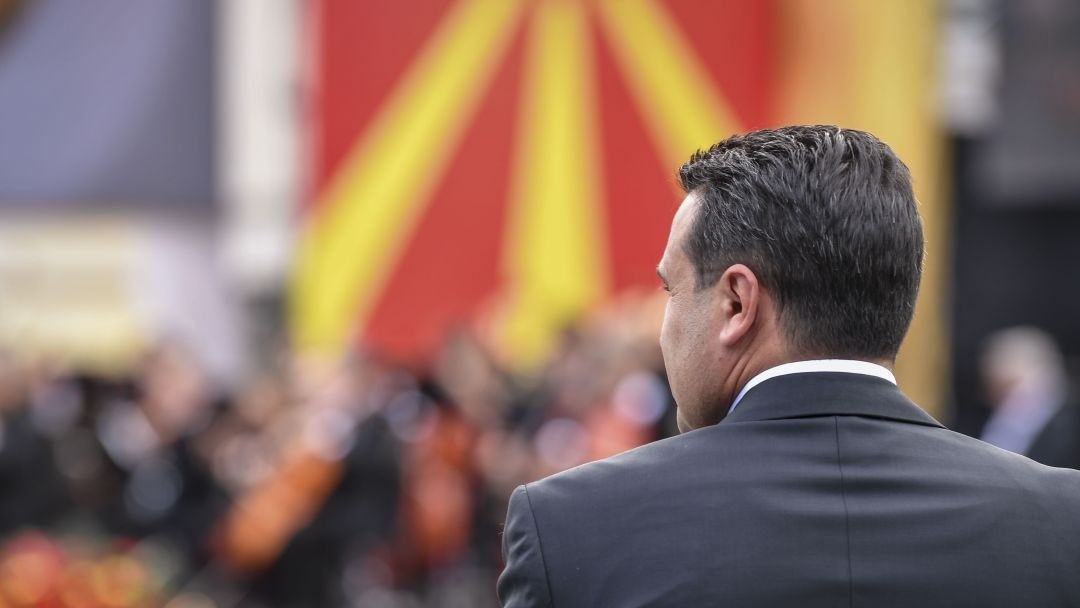It is never good news when a political party with a long history of antagonistic nationalism and criminality threatens to retake power. This is doubly so in the Balkans, with its history of conflict. Events in North Macedonia are therefore worth some urgent attention, lest what seems like a very local dispute suddenly takes on a wider significance.
The latest trouble began when the ruling party, the Social Democratic Union of Macedonia (SDSM), performed badly in local elections. The vote was a likely bellwether for national elections, which may be called early. If won by the opposition Internal Macedonian Revolutionary Organization–Democratic Party for Macedonian National Unity (VMRO-DPMNE) — which only narrowly failed to unseat the government in a parliamentary confidence vote — there may be serious negative implications.
Firstly, North Macedonia’s passage to European Union (EU) membership will become still harder; and secondly, it may also fan the flames of disputes with neighbors, who are easily able to make life difficult for a landlocked country. That could further tarnish the reputation of the Western Balkans region in Western capitals. In short, it does matter.
Five years ago, the SDSM evicted the nationalist VMRO-DPMNE from power. A year later, it swept through the country’s biggest municipalities to control 57 out of 80 municipalities – leaving its main opposition with only five. Now the Social Democratic Union is barely hanging on; the opposition captured 42 municipalities, including the capital of Skopje, leaving the ruling party with 16 cities. The massive reversal of fortune not only led Zoran Zaev, the party leader, to announce his resignation, but VMRO-DPMNE leader Hristijan Mickoski to file a motion of no confidence that would have led to the formation of a new government. Only a last-minute defection from MP Kastriot Rexhelpi, a member of the Albanian party, denied the opposition 61-vote threshold (by disappearing; only later did he resurface to deny opposition claims he had been kidnapped.)
The country is badly divided and its future path is unclear. The situation is in a stalemate. Western diplomats are — as they should — getting heavily involved; Rexhelpi specifically cited “strong signals from our strategic partners” in explaining his failure to attend the crucial vote, “for the good of processes.”
But what can the ruling party do? Without a clear majority and clear leadership, it will likely struggle to offer significant legislation on the reforms necessary to counter corruption and meet EU accession requirements. One thing likely to make matters worse is popular disappointment at unrealized EU aspirations. Issues like the ongoing energy crisis may also take a toll.
Let us count the reasons why the VMRO-DPMNE causes such alarm in the West. First, the party is ultra-nationalist, in stark contrast to the multinationalism required by the EU. The party also propagates antikvizacija (or antiquization), a term used by opponents to describe the party’s identity politics, which traces the modern, largely Slavic republic to the Hellenic ruler, Alexander the Great. Needless to say, there is no significant place for minorities in this version of history.
Second, during its time in power, VMRO-DPMNE was known for nepotism, patronage, and outright criminal behavior, including money laundering. Former party leader and prime minister Nikola Gruevski famously wiretapped more than 20,000 people in a small country of 2.1 million. This was the crisis, in fact, that catapulted SDSM into power.
Third, in recent years, VMRO-DPMNE has moved from a pro-EU and pro-NATO position to seemingly pro-Russian and somewhat anti-Western rhetoric. This has been fueled by Russia and Serbia, which have worked to promote anti-Western sentiments and sow division.
Fourth, and linked to the above issue, the party has a beef with two NATO neighbors: Greece and Bulgaria. It has taken a strong stance against the Prespa agreement, which resolved a number of disputes between Greece and North Macedonia, and it has openly opposed the Friendship Treaty with Bulgaria, a bilateral agreement designed to bolster relations.
Evidently, there are good reasons to fear VMRO-DPMNE’s return. Antikvizacija risks bifurcating North Macedonia, which consists of Macedonians (64%), Albanians (25%), Turks (3.5%), Roma (2.6%), and various other ethnic groups. It may also threaten to reopen the name dispute with Greece and undo the Friendship Treaty with Bulgaria. Worsening relations would provide fuel for Greek and Bulgarian nationalists, and both governments would be pressed to indefinitely block North Macedonia’s EU bid. That would create needless and time-consuming tension between the three NATO allies and weaken the alliance, which operates on the basis of consensus. The winner, as so often when things go wrong, would be Russia and its friends in Serbia.
What might help? A serious statement of intent from the EU in support of future membership for a moderate government might give some assistance to a disorientated leadership, as will active engagement on the ground by NATO allies. The US, EU, and UK must continue to promote anti-corruption measures, accountability, and the rule of law in North Macedonia. Russia — accused of engineering a coup attempt in 2016 — needs to be closely watched especially for its trademark attempts at electoral interference, especially given that early elections are likely.
It will not take a lot of effort to stoke the VMRO-DPMNE’s nationalist, pro-Russian, and anti-Western fires. Support for North Macedonia should therefore be geared towards helping the country fight disinformation and preventing state-sponsored cyberattacks aimed at manipulating the upcoming elections. The rest is in the hands of the North Macedonian people.
Janelle Clausen is an intern with CEPA’s Democratic Resilience program and a graduate student at Georgetown University.
Dr. Leon Hartwell is a Senior Fellow at CEPA, affiliated with both our Transatlantic Leadership and Democratic Resilience programs.
Europe’s Edge is CEPA’s online journal covering critical topics on the foreign policy docket across Europe and North America. All opinions are those of the author and do not necessarily represent the position or views of the institutions they represent or the Center for European Policy Analysis.





